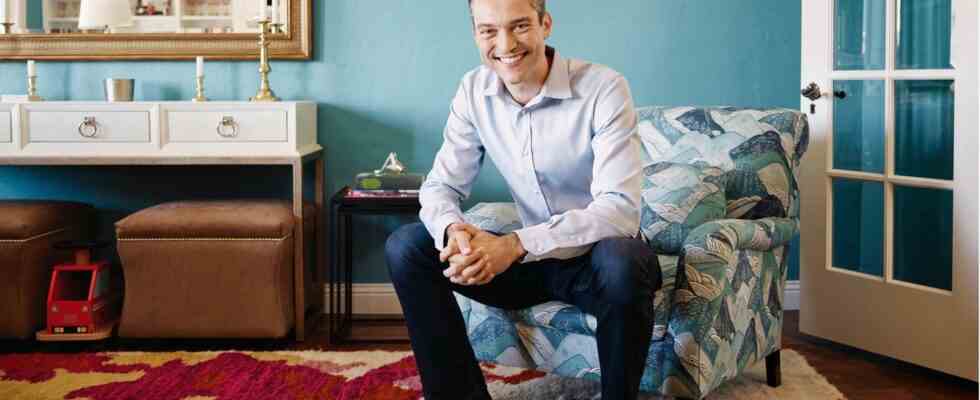When Airbnb was founded, it was the result of an economic crisis. And Corona also gave the company an unexpected boost. In conversation with the star strategy chief and co-founder Nathan Blecharczyk explains why he sees the current crisis as an opportunity. And how travel has changed.
Mr. Blecharczyk, you are the head of strategy at Airbnb, you founded the company together with CEO Brian Chesky and your roommate Joe Gebbia.
We started out in tough economic times, during the 2008 recession. Joe, Brian and I were in dire need of money and started letting our first guests sleep with air mattresses on the floor. “Airbed and Breakfast” became Airbnb. We just wanted to be able to pay for our apartment. Many of the first users were people who had just lost their jobs.
Today the situation is similar again.
From surveys around the world, we know what drives our users. More than 30 percent of German hosts state that occasionally renting out their home is a way of dealing with the increased cost of living. This number is quite similar everywhere. Everyone feels the economic pressure, and letting can help.
Is that reflected in your business?
The interest in hosting is huge. Since the beginning of the pandemic, we have had around 60 million visitors to our site who are interested in how to create a listing for a place to stay. But we only have four million registered hosts. There is a great deal of curiosity, but hesitancy often seems to prevail.
That is understandable. The guests are left in the protection of the home.
For many, renting out your own four walls is still a very unfamiliar thought. It wasn’t like that before Airbnb. There’s a huge trust barrier, after all you’re letting a stranger stay with you. This is exactly what our most recent announcement is about: We want to make it as easy as possible for potential hosts to get used to this idea and take the first step.
“How do you start? How do you learn to trust the guests?”
What fears do you see most often in new hosts?
The questions are always the same. how to start How do you learn to trust guests? We therefore connect new hosts directly to one of the so-called superhosts when registering in the app. These are experienced hosts with very good ratings. They answer questions and help prepare an offer. We also rely on experience when it comes to our guests: the first ones are experienced and well rated on request, they know what to expect and other hosts can trust them.
However, both only come when a new host has already decided to set up an account. How to reach those potential hosts who are hesitant to take the step themselves?
We do a lot of surveys about it. What stands in the way of the decision, what are people afraid of when they are supposed to let strangers into their homes? Most people are most likely to be held back by their uncertainty as to whether someone really wants to live with them. In their area, their living situation, their furniture and so on. To ease those worries, we also show new hosts other offers in their area at setup, including pricing. You quickly get a feeling that there is demand for what you can offer yourself, as long as the price is right.
France
Legendary place: Paris’s Moulin Rouge is now bookable on Airbnb for the first time
But that also takes place after the decision.
That’s correct. In order to take away the fundamental fear, we rely above all on protecting the hosts. We introduced a general ban on parties for all Airbnbs and now insure hosts’ belongings for up to three million dollars with our program Aircover, which is free for all hosts and applies to every booking – including boats or artwork.
Airbnb: That has changed when traveling
With the onset of the pandemic, Airbnb experienced a major slump – and then a gigantic boom. People wanted to travel but avoid the crowds at hotels. The home office allowed working from anywhere. Do you think we are dealing with a lasting change in thinking here or will many people fall back into old habits?
There has definitely been a sea change in what is expected when travelling. Some things have returned to normal, we are allowed to travel across borders again as before. Mobile working did not exist before, but will remain part of everyday life for many people. This also changes the perspective on travel, on the question of how long they can stay.
We feel this change in long-term rentals, for example. They now make up 20 percent of the nights booked on Airbnb. During the pandemic, it continued to increase and has remained stable since then. That kind of flexibility stays. There has also been a greater awareness that there are often beautiful travel destinations nearby. You don’t have to fly, you just get in the car, drive a few hundred kilometers and have a great time. And it helps that you can now search Airbnb in unique categories: Without having a specific destination in mind, you are suggested places – maybe very close by – that you would never have found otherwise.

Founded in a crisis, Airbnb saw its biggest boom during the pandemic. Now the next economic crisis is just around the corner. Aside from more users renting out their homes due to lack of funds, what impact do you expect?
The danger of a recession cannot be denied. Many people will have to watch their budget. Nevertheless, I see Airbnb in a strong position. There is a need to travel that will not fundamentally change. We have offers in every price range and can offer a wide variety of destinations for every budget. I therefore see it more as an opportunity for us to gain market share compared to the classic hotel industry. Regardless of how the overall economy develops.
Do you see a connection with the economic situation?
We cannot prove direct causality, but there is a measurable increase in the cost of living and thus also an incentive to offer one’s home or parts of it for rent. During the pandemic, many of the new offers were outside of the big cities, often including holiday homes. Rural housing this spring was nearly 70 percent higher than before the pandemic, driven by continued demand for overnight stays outside of cities. I would expect more people to rent out their primary homes as well given the state of the economy. We can already observe that the number of private rooms worldwide has increased by around 31 percent compared to last year, and in Germany it is even 50 percent.
As head of strategy, you are responsible for the direction of the company. A lot was tried for a while, Airbnb wanted to venture into other business areas. Which experiments should one have avoided?
Before Covid we had many different plans, wanting to cover every aspect of the travel business. After all, we know our users and their needs very well. We see that people appreciate the unique offers. The tree houses, homes with amenities like basketball courts or bowling alleys, or historic dwellings. This diversity is what makes it so appealing for many. However, our users booked flights and the like on other portals. So why shouldn’t we offer everything from a single source?
I still think that we could have built up a business slowly with that. But it wouldn’t have been a particularly good one. The truth is, we wouldn’t have excelled in that area. Sure, we have a loyal community. But if we had offered flights, they would not have differed from those of other service providers.
Then stay with the core business.
During the pandemic we had to make some tough decisions, had to lay off 1800 employees. We had to decide which projects would really bring us forward strategically and in the long term. And these are the unique accommodations on our platform. Nobody else offers that in this way. And there are still many potential hosts with whom we can continue to grow. If we convince them.

